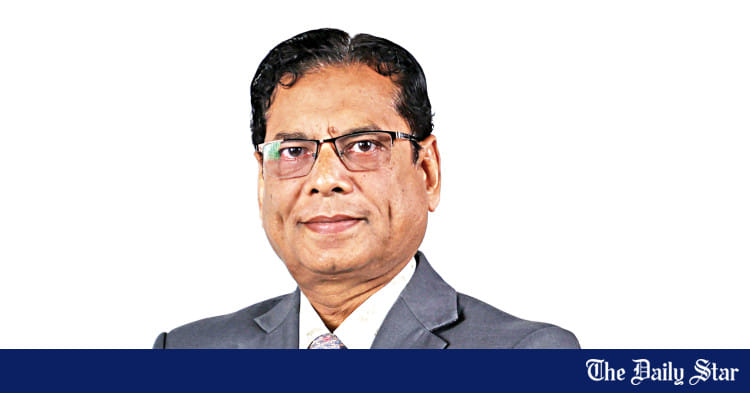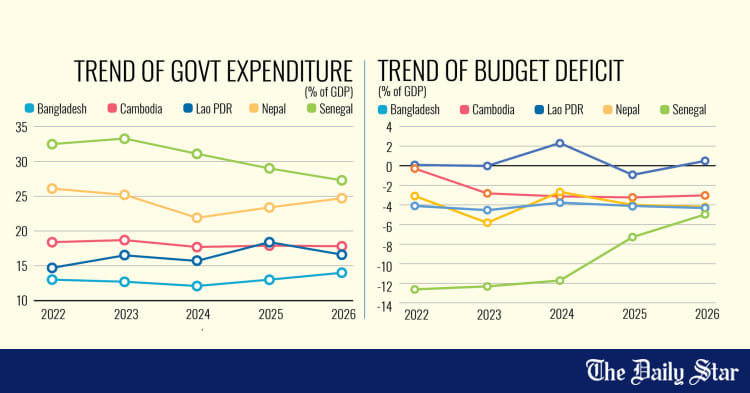Saif
Senior Member
- Joined
- Jan 24, 2024
- Messages
- 15,397
- Reaction score
- 7,874
- Nation

- Residence

- Axis Group


Bangladesh must prepare for post-LDC challenges
Bangladesh is set to graduate from the least-developed country (LDC) club next year, which will bring several challenges in international trade.
Bangladesh must prepare for post-LDC challenges
CPD’s Mustafizur Rahman tells The Daily Star

Mustafizur Rahman
Bangladesh is set to graduate from the least-developed country (LDC) club next year, which will bring several challenges in international trade.
However, the country is not yet prepared to face these challenges, Prof Mustafizur Rahman, a distinguished fellow of the Centre for Policy Dialogue (CPD), said in an interview with The Daily Star.
Bangladesh has met the criteria for graduation in all three categories -- per capita income, human asset index, and economic vulnerability index. It is expected to be upgraded at the next UN General Assembly meeting, scheduled for November 2026.
"It is very difficult to justify deferring graduation from the LDC status, as demanded by many businessmen," he said, adding that even if graduation is delayed, only Bangladesh and Afghanistan will remain in LDC status in this region.
The chief adviser to the interim government last week ordered all concerned to prepare for LDC graduation on time and Prof Rahman echoed those sentiments, saying the focus now should be on preparing to face post-LDC challenges.
He said about 70 percent of Bangladesh's exports to other countries currently benefit from preferential trade agreements, which will be phased out after graduation.
For instance, tariffs in the European Union (EU) market will increase by around 11.5 percent after LDC graduation, while an additional 15 percent will be imposed in the Canadian market.
Increased tariffs in markets like the EU and Canada will pose new challenges, said Rahman, who was a professor at the Department of Accounting and Information Systems at Dhaka University before joining the CPD full-time.
"But we are not taking adequate preparation."
To stay competitive, Bangladesh must enhance enterprise-level productivity, streamline trade facilitation, and improve compliance.
"As we graduate from the LDC category, our priority should shift from preference-based competition to efficiency-driven competition."
Exporters' costs rise if trade facilitation and logistics are not up to the mark, so steps must be taken to reduce these costs.
Bangladesh must also improve labour and environmental standards. As an LDC, buyers and consumers in developed nations have overlooked these issues. Once the country graduates, international buyers will emphasise them.
"So, it is high time to start focusing on these issues," said Rahman.
After graduation, Bangladesh will have to comply with the Agreement on Trade-Related Aspects of Intellectual Property Rights (TRIPS) regulations, which may create difficulties for the pharmaceutical sector in exporting products.
"So, we should prepare for these situations."
Meanwhile, Donald Trump has shaken global trade by imposing tariffs. Many believe countries like Bangladesh will benefit from the tariff barriers imposed on China, Canada and Mexico.
"I have a slightly different view," said Rahman. "I don't think we should rely heavily on this."
When Trump imposed a 25 percent tariff on China in 2016, Biden maintained it. During this period, Bangladesh had the opportunity to expand its ready-made garment (RMG) exports to the US, but it didn't see significant gains.
In fact, exports have slightly declined in recent years, said Rahman, who was awarded the Ibrahim Memorial Gold Medal by the University of Dhaka in 1999 for the best research work in economics.
China primarily exports non-cotton textiles, which make up around 80 percent of its total RMG exports, while Bangladesh focuses on cotton-based garments, creating market segmentation. Increased tariffs on China might benefit competitors in synthetic fibres but not Bangladesh, the economist clarified.
Moreover, such tariffs may negatively impact US economic growth and inflation, which, in turn, could affect global trade.
Instead of relying on geopolitical shifts, Bangladesh should enhance its competitiveness by reducing business costs, improving logistics, and increasing productivity.
Regarding free trade agreements (FTAs), the economist said Vietnam has 52 bilateral and multilateral free trade agreements, whereas Bangladesh has only one FTA with Bhutan.
This may be because signing FTAs requires offering lower import duties, a tough proposition considering that a significant portion of Bangladesh's revenue comes from duties.
Moreover, industrial and environmental standards will have to improve in factories, as FTAs operate on a reciprocal basis.
Since Bangladesh is set to graduate, there is no other option but to raise standards across all sectors, according to Prof Rahman.
Regarding economic stability, Rahman said several accumulated challenges existed when the interim government took power, and expectations were high.
"In the first and second quarters of the current fiscal year, economic pressure was intensifying. However, in the third quarter, some positive trends have emerged in certain indicators."
For example, Rahman said inflation remains high, but its rate has slightly declined. The availability of winter vegetables in the market during the third quarter has had a positive impact.
Besides, the adoption of a contractionary monetary policy, adjustments in revenue policies, and reductions in certain tariff rates were aimed at balancing fiscal and monetary policies. These measures seem to be having some effect, said the economist.
Another key factor is the external sector -- exports have seen double-digit growth, and remittances have recently experienced their highest growth in years.
As a result, the depletion of foreign currency reserves has halted, stabilising the exchange rate at around Tk 122 per dollar. The difference between the kerb market and the official exchange rate has also narrowed to about Tk 1.5 to Tk 2.
Consequently, imported inflation has somewhat decreased, positively impacting overall inflation, he said. However, inflation remains high, with both food and non-food inflation around 9 percent.
"This has continued to erode people's purchasing power, as wage growth has not kept pace with inflation.
"I believe there is still room for action in market mechanisms. One approach is to increase the number of active market players. Previously, a small group dominated imports, but as some have exited, new importers have entered the market," he commented.
"With greater competition, prices have stabilised to some extent."
He added that another persistent issue is extortion in certain areas. This must be addressed with a zero-tolerance policy.
Moreover, maintaining sufficient stock levels of key commodities and timely open market sales can help stabilise prices, he said.
Historically, poor data management has led to inaccurate decisions regarding production, import volumes, and stock releases. Addressing this issue can lead to more effective market interventions, the economist said.
The biggest concern is now investment. Since Bangladesh adopted a contractionary monetary policy to control inflation, interest rates have risen.
Besides, the banking sector is burdened by the significant accumulation of non-performing loans (NPLs), making it difficult to lower interest rates.
One of the major challenges is how to generate employment and how to reinvigorate investment so that entrepreneurs can actively engage.
Rahman said many investors are likely awaiting elections, hoping political uncertainty will subside afterwards, as investment decisions are usually made with a medium-term outlook.
Regarding the recovery of stolen money, Rahman, who was a member of the white paper formulation committee, said some initiatives have been undertaken.
The Bangladesh Bank has formed a special task force, and the Bangladesh Financial Intelligence Unit (BFIU) and the Anti-Corruption Commission (ACC) are also showing some activity.
However, this process needs to be expedited. Special prosecutions should be pursued where necessary. Recovering laundered money requires legal validation and the establishment of a paper trail to identify ultimate beneficiaries.
"The country must invest in this."
If other nations can recover laundered money, so can Bangladesh. Taking action now will also send a strong message that financial crimes will not go unpunished, he added.
CPD’s Mustafizur Rahman tells The Daily Star
Mustafizur Rahman
Bangladesh is set to graduate from the least-developed country (LDC) club next year, which will bring several challenges in international trade.
However, the country is not yet prepared to face these challenges, Prof Mustafizur Rahman, a distinguished fellow of the Centre for Policy Dialogue (CPD), said in an interview with The Daily Star.
Bangladesh has met the criteria for graduation in all three categories -- per capita income, human asset index, and economic vulnerability index. It is expected to be upgraded at the next UN General Assembly meeting, scheduled for November 2026.
"It is very difficult to justify deferring graduation from the LDC status, as demanded by many businessmen," he said, adding that even if graduation is delayed, only Bangladesh and Afghanistan will remain in LDC status in this region.
The chief adviser to the interim government last week ordered all concerned to prepare for LDC graduation on time and Prof Rahman echoed those sentiments, saying the focus now should be on preparing to face post-LDC challenges.
He said about 70 percent of Bangladesh's exports to other countries currently benefit from preferential trade agreements, which will be phased out after graduation.
For instance, tariffs in the European Union (EU) market will increase by around 11.5 percent after LDC graduation, while an additional 15 percent will be imposed in the Canadian market.
Increased tariffs in markets like the EU and Canada will pose new challenges, said Rahman, who was a professor at the Department of Accounting and Information Systems at Dhaka University before joining the CPD full-time.
"But we are not taking adequate preparation."
To stay competitive, Bangladesh must enhance enterprise-level productivity, streamline trade facilitation, and improve compliance.
"As we graduate from the LDC category, our priority should shift from preference-based competition to efficiency-driven competition."
Exporters' costs rise if trade facilitation and logistics are not up to the mark, so steps must be taken to reduce these costs.
Bangladesh must also improve labour and environmental standards. As an LDC, buyers and consumers in developed nations have overlooked these issues. Once the country graduates, international buyers will emphasise them.
"So, it is high time to start focusing on these issues," said Rahman.
After graduation, Bangladesh will have to comply with the Agreement on Trade-Related Aspects of Intellectual Property Rights (TRIPS) regulations, which may create difficulties for the pharmaceutical sector in exporting products.
"So, we should prepare for these situations."
Meanwhile, Donald Trump has shaken global trade by imposing tariffs. Many believe countries like Bangladesh will benefit from the tariff barriers imposed on China, Canada and Mexico.
"I have a slightly different view," said Rahman. "I don't think we should rely heavily on this."
When Trump imposed a 25 percent tariff on China in 2016, Biden maintained it. During this period, Bangladesh had the opportunity to expand its ready-made garment (RMG) exports to the US, but it didn't see significant gains.
In fact, exports have slightly declined in recent years, said Rahman, who was awarded the Ibrahim Memorial Gold Medal by the University of Dhaka in 1999 for the best research work in economics.
China primarily exports non-cotton textiles, which make up around 80 percent of its total RMG exports, while Bangladesh focuses on cotton-based garments, creating market segmentation. Increased tariffs on China might benefit competitors in synthetic fibres but not Bangladesh, the economist clarified.
Moreover, such tariffs may negatively impact US economic growth and inflation, which, in turn, could affect global trade.
Instead of relying on geopolitical shifts, Bangladesh should enhance its competitiveness by reducing business costs, improving logistics, and increasing productivity.
Regarding free trade agreements (FTAs), the economist said Vietnam has 52 bilateral and multilateral free trade agreements, whereas Bangladesh has only one FTA with Bhutan.
This may be because signing FTAs requires offering lower import duties, a tough proposition considering that a significant portion of Bangladesh's revenue comes from duties.
Moreover, industrial and environmental standards will have to improve in factories, as FTAs operate on a reciprocal basis.
Since Bangladesh is set to graduate, there is no other option but to raise standards across all sectors, according to Prof Rahman.
Regarding economic stability, Rahman said several accumulated challenges existed when the interim government took power, and expectations were high.
"In the first and second quarters of the current fiscal year, economic pressure was intensifying. However, in the third quarter, some positive trends have emerged in certain indicators."
For example, Rahman said inflation remains high, but its rate has slightly declined. The availability of winter vegetables in the market during the third quarter has had a positive impact.
Besides, the adoption of a contractionary monetary policy, adjustments in revenue policies, and reductions in certain tariff rates were aimed at balancing fiscal and monetary policies. These measures seem to be having some effect, said the economist.
Another key factor is the external sector -- exports have seen double-digit growth, and remittances have recently experienced their highest growth in years.
As a result, the depletion of foreign currency reserves has halted, stabilising the exchange rate at around Tk 122 per dollar. The difference between the kerb market and the official exchange rate has also narrowed to about Tk 1.5 to Tk 2.
Consequently, imported inflation has somewhat decreased, positively impacting overall inflation, he said. However, inflation remains high, with both food and non-food inflation around 9 percent.
"This has continued to erode people's purchasing power, as wage growth has not kept pace with inflation.
"I believe there is still room for action in market mechanisms. One approach is to increase the number of active market players. Previously, a small group dominated imports, but as some have exited, new importers have entered the market," he commented.
"With greater competition, prices have stabilised to some extent."
He added that another persistent issue is extortion in certain areas. This must be addressed with a zero-tolerance policy.
Moreover, maintaining sufficient stock levels of key commodities and timely open market sales can help stabilise prices, he said.
Historically, poor data management has led to inaccurate decisions regarding production, import volumes, and stock releases. Addressing this issue can lead to more effective market interventions, the economist said.
The biggest concern is now investment. Since Bangladesh adopted a contractionary monetary policy to control inflation, interest rates have risen.
Besides, the banking sector is burdened by the significant accumulation of non-performing loans (NPLs), making it difficult to lower interest rates.
One of the major challenges is how to generate employment and how to reinvigorate investment so that entrepreneurs can actively engage.
Rahman said many investors are likely awaiting elections, hoping political uncertainty will subside afterwards, as investment decisions are usually made with a medium-term outlook.
Regarding the recovery of stolen money, Rahman, who was a member of the white paper formulation committee, said some initiatives have been undertaken.
The Bangladesh Bank has formed a special task force, and the Bangladesh Financial Intelligence Unit (BFIU) and the Anti-Corruption Commission (ACC) are also showing some activity.
However, this process needs to be expedited. Special prosecutions should be pursued where necessary. Recovering laundered money requires legal validation and the establishment of a paper trail to identify ultimate beneficiaries.
"The country must invest in this."
If other nations can recover laundered money, so can Bangladesh. Taking action now will also send a strong message that financial crimes will not go unpunished, he added.




















